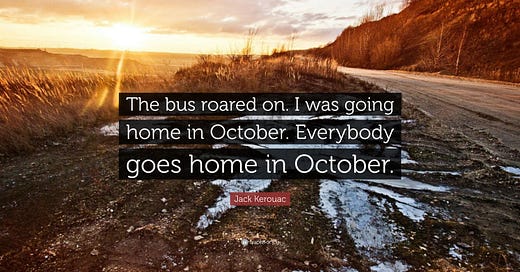Divine Light, Sex, Alcohol, and Kerouac
It's October again, Kerouac month, a month that always passes too quickly -- as if bent on proving the vain and visionary nature of phenomenal existence.
If there is divine light, sexual indulgence prevents it from streaming in. Herein lies the best argument for continence. The sex monkey may not be as destructive of the body as the booze monkey, but he is more destructive of the spirit. You may dismiss what I am saying here either by denying that there is any divine light, or by denying that sexual indulgence impedes its influx, or both. But if you are in the grip of either monkey I will dismiss your dismissal. Why should I listen to a man with a monkey on his back? How do I know it is the man speaking and not the monkey?
Poor Kerouac got the holy hell beaten out of him by the simian tag team. The Ellis Amburn biography goes into the greatest detail regarding Kerouac's homo- and hetero-erotic sexual excesses. His fatal fondness for the sauce, for the devil in liquid form, is documented in all the biographies.
It is not that the lovable dharma lush did not struggle mightily in his jihad against his lower self. He did, in his Buddhist phase in the mid-fifties, before the 1957 success of On the Road and the blandishments of fame did him in. Worldly success is an ambiguous good. Some of the Dharma (Viking 1997) offers the best documentation of Jack's attempt to tread the straight path to the narrow gate.
One lesson, perhaps, is that we cannot be lamps unto ourselves even if the Tathagata succeeded in pulling himself up into Nirvana by his samsaric sandal straps. To the vast run of us ordinary "poor suffering fucks" a religion of self-help is no help at all. The help we need, if help there be, must come from Elsewhere. Kerouac finished Some of the Dharma on 15 March 1956. The Dharma Bums was published in 1958. By 1959, Kerouac was moving away from Buddhism. On 10 June 1959 he wrote to Philip Whalen:
Myself, the dharma is slipping away from my consciousness and I cant think of anything to say about it anymore. I still read the diamond sutra but as in a dream now. Don't know what to do. Cant see the purpose of human or terrestrial or any kinda life without heaven to reward the poor suffering fucks. The Buddhist notion that Ignorance caused the world leaves me cold now, because I feel the presence of angels. (Some of the Dharma, Viking 1997, editor's introduction.)
And so in the end Jack returned to the religion of his childhood.
The Last Interview was on12 October 1969. "I'm not a beatnik. I'm a Catholic." "I just sneak into church now, at dusk, at vespers. But yeah, as you get older you get more . . . genealogical."
As much of a screw-up and sinner as he was, as irresponsible, self-indulgent, and self-destructive, Kerouac was a deeply religious man. He went through a Buddhist phase, but at the end he came home to Catholicism.
"Everybody goes home in October." (On the Road, Part I, Ch. 14, Para 1) Jack died nine days after the Last Interview on 21 October securing his release from the samsaric wheel of the quivering meat conception, and the granting of his wish:
The wheel of the quivering meat conception . . . . . . I wish I was free of that slaving meat wheel and safe in heaven dead. (Mexico City Blues, 1959, 211th Chorus).
Here is the whole paragraph:
At dawn my bus was zooming across the Arizona desert -- Indio, Blythe, Salome (where she danced); the great dry stretches leading to Mexican mountains in the south. Then we swung north to the Arizona mountains, Flagstaff, clifftowns. I had a book with me I stole from a Hollywood stall, "Le Grand Meaulnes" by Alain-Fournier, but I preferred reading the American landscape as we went along. Every bump, rise, and stretch in it mystified my longing. In inky night we crossed New Mexico; at gray dawn it was Dalhart, Texas; in the bleak Sunday afternoon we rode through one Oklahoma flat-town after another; at nightfall it was Kansas. The bus roared on. I was going home in October. Everybody goes home in October.




